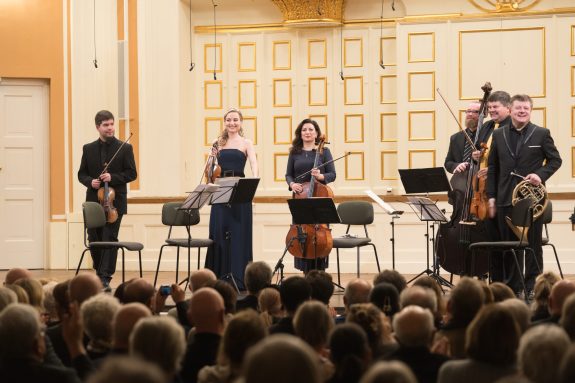 Austria Mozartwoche Salzburg 2024 [4] – Mozart, Reicha, and Michael Haydn: Baborák Ensemble (Radek Baborák [horn], Milan Al-Ashhab, [violin], Martina Bačová [violin, viola], Karel Untermüller [viola], Hana Baboráková [cello], David Pavelka [double bass]). Grosser Saal, Mozarteum, Salzburg, 29.1.2024. (MB)
Austria Mozartwoche Salzburg 2024 [4] – Mozart, Reicha, and Michael Haydn: Baborák Ensemble (Radek Baborák [horn], Milan Al-Ashhab, [violin], Martina Bačová [violin, viola], Karel Untermüller [viola], Hana Baboráková [cello], David Pavelka [double bass]). Grosser Saal, Mozarteum, Salzburg, 29.1.2024. (MB)

Mozart, arr. Radek Baborák – Horn Concerto No.4 in E-flat major, KV 495
Anton Reicha – Quintet for horn, string quartet, and double bass in E major, Op.106
Michael Haydn – Horn Concerto in D major, MH 134: Larghetto and Allegro ma non troppo
Mozart, completed Süssmayr (ed. Baborák) – Rondo for horn quintet in D major, KV 514
Mozart – Horn Quintet in E-flat major, KV 407
Not very often does one have opportunity to hear a chamber concert led by a horn player. Still less will it be by one of the distinction of Radek Baborák. Still less than that will the rest of the ensemble be of the distinction of the players Baborák brought together for this, the fourth of my Mozartwoche performances this year. Mixing the familiar and the considerably less so, it proved a joy from beginning to end.
The former was provided by Mozart’s Fourth Horn Concerto, arranged for ensemble by Baborák. Such an ensemble will never quite sound as if it were an orchestra, perhaps especially in such familiar music, but it imparted a proper sense of ensemble tutti nonetheless. At the very opening, it could perhaps have afforded to play out a little more given the new balance, but solo playing was of such calibre that it mattered not. Phrasing, articulation, dynamic contrasts: all were achieved with apparent effortlessness, married to profound chamber sensitivity from all in a first movement of grace, light, and shade. Baborák’s own cadenzas were stylish and, at times, in the best sense surprising. Grace characterised the slow movement too, its course traced with affection and understanding, players taking all the time in the world but never too much. The finale was likewise possessed of the kind of ‘rightness’ one does not notice, that is a Mozartian rightness. It was a further delight, with a further, foot-stomping surprise to come in the cadenza.
Anton Reicha’s Horn Quintet followed, written about forty years later in the mid-1820s, given here with its ad libitum double bass. The first movement revealed an accomplished work with plenty to hold the interest, not least given a performance of accomplishment such as this. There was, at least to my Romantically inclined mind, a poignancy to its historical position in the wake of Mozart and Haydn, as with all such Austro-German music, Beethoven and Schubert included. Some intriguing harmonic turns both made sense and helped ensure the music never quite sounded ‘like’ anyone else’s. The development section’s counterpoint convinced, Reicha’s preparation for the return perhaps less so. If an editor might have shortened this movement, there was much to enjoy in its amiable, decidedly non-Beethovenian temperament and course. Likewise in the Lento second movement, though with its own particular character. Baborák’s playing was wonderfully long-breathed, readily complemented by sweet-toned strings, a surprisingly ardent episode keeping all of us on our metaphorical toes. Light fun was had with the minuet’s syncopations, a touch of something deeper offered in the trio. A sunny finale reflected much of work and performance; I cannot imagine the latter bettered.
The selection from Michael Haydn’s D major Horn Concerto, MH 134, might have seemed puzzling, in that Larghetto and Allegro non troppo suggested a second and third movement, in turn to preface Mozart’s fragmentary Rondo in D, KV 514. Tempo indications can be misleading, though, for these were in fact the first and second movement. In any case, the first took us back to more Mozartian climes: Mozart’s (Salzburg) world, if not necessarily more than that, albeit with telling points of contact. This was another beautifully judged performance of considerable grace and, yes, depth, if worn lightly. Harmony and perhaps not only that stood closer, say, to Mozart than to the composer’s brother. Horn playing was to die for, with deeply sympathetic string accompaniment. I did not miss the full orchestra at all. The second movement was perhaps more distinctive, arguably a little closer to Joseph Haydn, though with a few harmonic touches very much Michael’s own. Mozart’s Rondo sounded every inch the classic hunting finale, though with a few strange turns doubtless to be ascribed to its peculiar nature and completion. Ultimately, though, the sense of ebullience with an implication of fragility were spot on, and there was no question who the presiding master was.
Mozart’s Horn Quintet, obviously without double bass and with one of the violinists taking up the viola, was arguably the sole ‘masterwork’ played ‘as it should be’, but here it was at most first among equals. In any case, the first movement offered all of the virtues from what had gone before: judicious tempo, excellent phrasing and playing, a keen sense of chiaroscuro, collegiality, and so on. It seemed very much to penetrate to the heart – in more than one sense – of the matter; but then, so did everything else. Directness of emotion in the slow movement was not at odds with implicit and explicit compositional sophistication, far from it. Likewise, in different vein, for the finale: sunny, yet never quite without the implication of something darker. Joy is a strange, even difficult thing in Mozart’s universe, as we also heard in the extraordinary encore performance of the slow movement from the Clarinet Quintet.
Mark Berry
